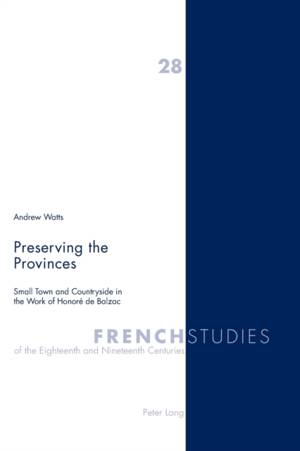
Bedankt voor het vertrouwen het afgelopen jaar! Om jou te bedanken bieden we GRATIS verzending (in België) aan op alles gedurende de hele maand januari.
- Afhalen na 1 uur in een winkel met voorraad
- In januari gratis thuislevering in België
- Ruim aanbod met 7 miljoen producten
Bedankt voor het vertrouwen het afgelopen jaar! Om jou te bedanken bieden we GRATIS verzending (in België) aan op alles gedurende de hele maand januari.
- Afhalen na 1 uur in een winkel met voorraad
- In januari gratis thuislevering in België
- Ruim aanbod met 7 miljoen producten
Zoeken
€ 171,45
+ 342 punten
Omschrijving
Though famed for his vivid depictions of nineteenth-century Paris, Honoré de Balzac devoted as much of his creative energy to the provinces. This book examines the way in which he combined a theatrical tradition of anti-provincial satire with a more open celebration of French provincial life in the post-Revolutionary period. Ranging widely over texts from both within and outside La Comédie humaine, the author analyses Balzac's determination to invest the Rousseauist nostalgia for country over city with an updated rationale. A champion of central authority and absolutist government, Balzac is seen here in an unfamiliar role as the guardian of regional culture, a novelist who sought to record the diversity of France's small towns and villages before they were lost to industrialization and the railway age. Equally, the study reveals new aspects of his political engagement with questions impacting upon the provinces during the Restoration and July Monarchy, from broad issues such as agriculture and landownership, to more isolated grievances such as the implications of the 1827 Forest Code. The whole offers a fresh insight into Balzac's thought and literary aesthetic, and an assessment of his hitherto-neglected role in supporting the emergence of the regionalist novel, or roman du terroir, in the second half of the nineteenth century.
Specificaties
Betrokkenen
- Auteur(s):
- Uitgeverij:
Inhoud
- Aantal bladzijden:
- 344
- Taal:
- Engels
- Reeks:
- Reeksnummer:
- nr. 28
Eigenschappen
- Productcode (EAN):
- 9783039105830
- Verschijningsdatum:
- 7/11/2007
- Uitvoering:
- Paperback
- Formaat:
- Trade paperback (VS)
- Afmetingen:
- 152 mm x 229 mm
- Gewicht:
- 458 g

Alleen bij Standaard Boekhandel
+ 342 punten op je klantenkaart van Standaard Boekhandel
Beoordelingen
We publiceren alleen reviews die voldoen aan de voorwaarden voor reviews. Bekijk onze voorwaarden voor reviews.









